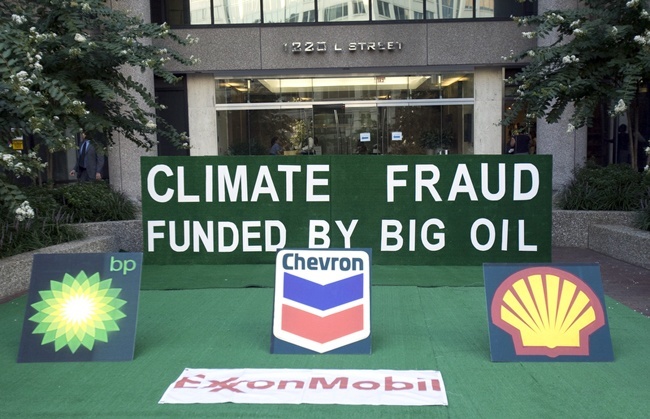-
Tips for becoming a good boxer - November 6, 2020
-
7 expert tips for making your hens night a memorable one - November 6, 2020
-
5 reasons to host your Christmas party on a cruise boat - November 6, 2020
-
What to do when you’re charged with a crime - November 6, 2020
-
Should you get one or multiple dogs? Here’s all you need to know - November 3, 2020
-
A Guide: How to Build Your Very Own Magic Mirror - February 14, 2019
-
Our Top Inspirational Baseball Stars - November 24, 2018
-
Five Tech Tools That Will Help You Turn Your Blog into a Business - November 24, 2018
-
How to Indulge on Vacation without Expanding Your Waist - November 9, 2018
-
5 Strategies for Businesses to Appeal to Today’s Increasingly Mobile-Crazed Customers - November 9, 2018
Despite knowing about Climate Change, Exxon continued to support its Denial
Bernstein said Exxon wanted to understand the potential concerns about climate change in the context of whether it would lead to regulations that would affect Natuna and other potential projects. “They were well ahead of the rest of industry in this awareness”, Bernstein wrote in the e-mail. Other companies, such as Mobil, only became aware of the issue in 1988, when it first became a political issue.
Advertisement
And lastly, Bernstein also mentioned in his email that despite Exxon never having denied the potential impact of human activity on global warming, the company did challenge the validity of some scientific projections and funded various groups to promote the concept of climate change denial.
“The Climate Deception Dossiers” report – released Wednesday by the Union of Concerned Scientists (UCS), a U.S.-based nonprofit science advocacy organization – chronicles the deceptions of fossil fuel companies and trade groups through internal documents and memos that were either leaked to the public or disclosed through lawsuits or Freedom of Information Act (FOIA) requests.
As early as 1977, the report’s authors note, “representatives of fossil fuel companies including BP, Chevron, ConocoPhillips, ExxonMobil, Peabody Energy, and Shell attended dozens of congressional hearings in which the contribution of carbon emissions to the greenhouse effect and other aspects of climate science were discussed”.
Lenny Bernstein, Exxon’s ex- in-house climate expert, has asserted in an email that the oil company knew about climate change as early as 1981-seven years before the phenomenon came to the attention of the general public.
According to The Guardian, Exxon became aware of the potential that carbon-cutting regulations could hurt its bottom line over a generation ago and factored that knowledge into its decision on whether to develop an enormous gas field in south-east Asia. “This is an enormous reserve of natural gas, but it is 70% CO2”, or carbon dioxide, the main driver of climate change.
Bernstein said natural resource companies expect investments to have a shelf life of 50-100 years, and so the imminency of environmental regulations made their decision not to develop Natuna an easy one. “They may take what appears to be altruistic positions to improve their public image, but the assumption underlying those actions is that they will increase future profits”, Bernstein wrote in 2014.
According to Greenpeace, ExxonMobil, the world’s largest oil company, spent more than $30 million over the past 27 years on research that promoted climate change denial.
Despite the increasing severity of climate change impacts in the USA and around the world, fossil fuel industry campaigns to distort the realities around global warming and fossil fuels have not stopped.
She compared Exxon’s behavior to how tobacco companies denied the connection between smoking and lung cancer for the sake of profits.
The company now says it recognizes climate change as a risk, saying on its website that addressing greenhouse gas emissions “is one among other important world priorities, such as economic development, poverty eradication and public health”.
When interviewed by the Guardian, Rick Keil, an Exxon spokesman, said, “There was nobody you could have gone to in 1981 or 1984 who would have said whether it [climate change] was real or not”.
Exxon was considering climate risks in its energy prospecting operations as far back as the 1980s, but went on to spend tens of millions of dollars to create doubt about the reality of global warming, and succeeded in derailing strong climate policies in the United States for decades.
‘We have been factoring the likelihood of some kind of carbon tax into our business planning since 2007.
Advertisement
Sharon Eubanks, the lawyer from the Federal Department of Justice who led the case against the tobacco giant warns that this new turnout looks surprisingly like a big conspiracy against the reality that is climate change.




























